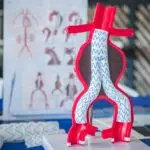Aortic Dissection Awareness Day is observed on September 19 every year. The objective of the day is to raise awareness about aortic dissection, a relatively unknown but life-threatening disorder. Several organizations across the globe offer patients, their families, medical professionals, and the general public a range of resources to help them understand the condition better. Aortic dissection is a condition in which the inner layer of the body’s main artery (aorta) tears. Blood flowing through the aorta rushes out through the tear, which causes the inner and middle layers of the artery to split. If the individual’s blood seeps through the outermost layer of the aorta, the dissection is usually deadly.
History of Aortic Dissection Awareness Day
Aortic dissection is a condition in which the inner layer of the body’s main artery (aorta) tears. Blood flowing through the aorta rushes out through the tear, which causes the inner and middle layers of the artery to split. If the individual’s blood flows through the outermost layer of the aorta, the dissection is usually deadly. The condition is generally uncommon. It tends to occur in men in their ’60s and ’70s.
The symptoms of aortic dissection are similar to the symptoms of several other heart conditions, often leading to a delay in the diagnosis of the problem. When the aortic dissection is spotted and subsequently treated in time, the patient’s chance of survival increases manyfold. The symptoms of aortic dissection include sudden and severe pain in the chest or upper back, sudden and severe stomach pain, loss of consciousness, shortness of breath, leg pain, weak pulse in one arm or thigh, and trouble walking. The condition is caused by a weakened aortic wall.
They are split into two groups, depending on which area is affected. Type A aortic dissection is more common and dangerous than type B, as it involves a tear in the part of the aorta that exits the heart; herein, the tear may occur in the upper aorta — this can extend to the abdomen. Type B involves a tear in the lower aorta only — this may also extend to the abdomen.
The earliest full documentation of aortic dissection is attributed to Frank Nicholls, who drafted an autopsy report of King George II of Great Britain in 1760. The term ‘aortic dissection’ was first used in 1802 by French physician J.P. Manoir. Surgery for aortic dissection was first developed by DeBakey, Cooley, and Creech in 1954. DeBakey developed the condition himself in 2005 and underwent surgery in 2006.
Aortic Dissection Awareness Day timeline
Aortic dissection is first described in an autopsy.
The term ‘aortic dissection’ is coined.
Surgery is developed as a treatment for aortic dissection.
Endovascular treatment is developed for aortic dissection.
Aortic Dissection Awareness Day FAQs
What is the life expectancy of someone with aortic dissection?
Survival rates range from 45% to 94%.
Does aortic dissection cause instant death?
In about 40% of cases, yes.
Do those with aortic dissection qualify for disability benefits?
Yes, it qualifies a patient for Social Security Disability benefits.
How to Observe Aortic Dissection Awareness Day
Learn about the condition
Learn about aortic dissection. It will equip you to help others that may have the condition.
Share what you’ve learned
Tell your family about what you’ve learned. Sharing information will allow more people to be educated about aortic dissection.
Talk about it on social media
Help the cause by talking about aortic dissection on social media. You can share an interesting article on the topic or any latest research that you came across.
5 Interesting Facts About The Heart
As big as a fist
The average heart is as big as an adult’s fist.
The heart beats 115,000 times a day
The heart beats approximately 115,000 times per day.
It pumps about 2,000 gallons of blood
The heart pumps about 2,000 gallons of blood daily.
The first implantable pacemaker
The first implantable pacemaker was invented in 1958.
The largest heart among mammals
Whales have the largest hearts of any mammals.
Why Aortic Dissection Awareness Day is Important
It raises awareness about an important issue
Aortic Dissection Awareness Day educates people about a very important health condition. It is good to be informed in the event so you offer support to someone who may be suffering from it.
It encourages conversation
Aortic Dissection Awareness Day encourages conversation about a little-known disease. The more conversations we have, the more people will learn about it.
It promotes proactive healthcare
A greater degree of awareness promotes a more proactive approach to healthcare. This will benefit us all in living longer, healthier lives.
Aortic Dissection Awareness Day dates
| Year | Date | Day |
|---|---|---|
| 2024 | September 19 | Thursday |
| 2025 | September 19 | Friday |
| 2026 | September 19 | Saturday |
| 2027 | September 19 | Sunday |
| 2028 | September 19 | Tuesday |











